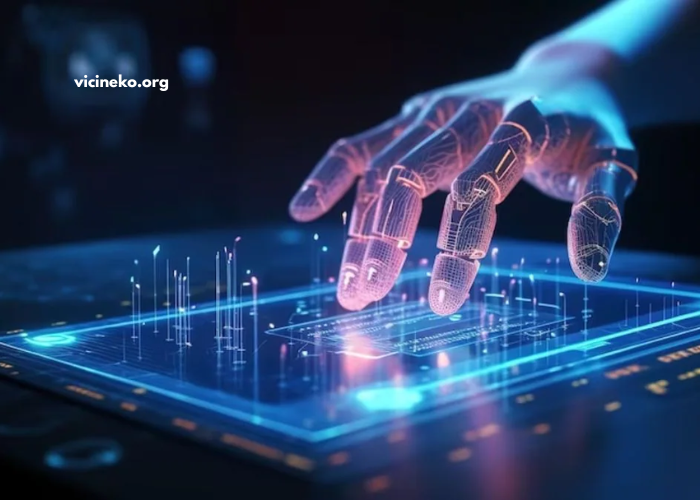In the modern era, Artificial Intelligence (AI) has become an integral part of various industries and daily life, revolutionizing the way we interact with technology. From smart devices to automation systems, AI is influencing every aspect of modern technology, creating smarter and more efficient solutions for everyday tasks. This article delves into the role AI plays in transforming everyday technology, discussing its impact across different sectors, its benefits, and potential challenges.
What is Artificial Intelligence?
Artificial Intelligence refers to the simulation of human intelligence processes by machines, especially computer systems. These processes include learning (acquiring and applying knowledge), reasoning (problem-solving), and self-correction. AI has evolved significantly over the years, enabling machines to perform tasks that once required human intelligence. Today, AI systems are capable of understanding speech, making decisions, recognizing images, and even driving vehicles autonomously.
AI in Everyday Technology
AI has penetrated various aspects of daily life, from smart assistants in homes to AI-powered algorithms in social media. Here’s a look at some of the key areas where AI is transforming everyday technology:
1. Smart Homes and Voice Assistants
AI-powered voice assistants such as Amazon’s Alexa, Apple’s Siri, Google Assistant, and Microsoft’s Cortana are transforming how people interact with technology in their homes. These voice-controlled systems allow users to manage smart devices, set reminders, control lighting, and even order products with just a voice command. AI enhances these assistants by improving their ability to understand natural language, provide more accurate responses, and adapt to user preferences over time.
Impact on Smart Homes
Smart homes equipped with AI-driven devices such as thermostats, security cameras, and voice assistants are becoming more efficient and easier to manage. AI allows these devices to learn from user behavior and preferences, enabling them to optimize energy consumption, enhance security, and improve overall convenience. For example, an AI-powered thermostat can adjust the temperature of a home based on the inhabitants’ routines, leading to energy savings.
2. AI in Healthcare
AI is making significant strides in healthcare, where its potential to transform everyday medical practices is immense. From personalized treatment plans to diagnostic tools, AI is improving both the quality and accessibility of healthcare.
Personalized Medicine
AI enables doctors to provide more personalized care by analyzing patient data, including genetics, medical history, and lifestyle. AI algorithms can predict the likelihood of certain diseases and recommend tailored treatments. With AI, healthcare providers can optimize drug prescriptions, detect diseases earlier, and monitor patient progress in real-time.
AI-Powered Diagnostic Tools
AI-driven diagnostic tools are being integrated into medical imaging, allowing radiologists to detect abnormalities in X-rays, MRIs, and CT scans more accurately and quickly. For instance, AI systems can identify early signs of cancer, heart disease, and other critical conditions, providing better outcomes for patients by enabling earlier interventions.
3. AI in Transportation and Mobility
AI is revolutionizing the transportation sector, from autonomous vehicles to traffic management systems. Self-driving cars, trucks, and drones are reshaping how goods and people are transported, offering a glimpse into a future where travel is safer, more efficient, and more accessible.
Autonomous Vehicles
Self-driving cars are one of the most visible applications of AI in everyday technology. These vehicles use AI-powered systems to process data from sensors, cameras, and radar to navigate roads, recognize obstacles, and make real-time decisions. AI enables autonomous vehicles to operate safely without human intervention, with the potential to reduce accidents caused by human error and optimize traffic flow.
Traffic Management and Public Transit
AI is also being used to optimize traffic flow and improve public transportation systems. Intelligent traffic management systems analyze traffic patterns in real-time to reduce congestion and improve commute times. AI algorithms can predict traffic jams, adjust traffic lights accordingly, and suggest alternative routes for drivers. Additionally, AI can optimize bus and train schedules based on real-time data, making public transportation more reliable and efficient.
4. AI in Retail and E-Commerce
AI is transforming the retail and e-commerce industries by enabling businesses to better understand consumer behavior, personalize shopping experiences, and improve operational efficiency.
Personalized Shopping Experience
E-commerce platforms such as Amazon, eBay, and Shopify use AI algorithms to recommend products based on users’ browsing history, purchase behavior, and preferences. These personalized recommendations not only enhance the customer experience but also boost sales by presenting relevant products to potential buyers.
Inventory and Supply Chain Optimization
AI-powered systems are also helping retailers optimize inventory management and supply chain operations. By analyzing past sales data and predicting future demand, AI algorithms can forecast inventory levels, reducing overstocking and stockouts. This helps retailers save costs, improve product availability, and enhance customer satisfaction.
5. AI in Entertainment and Media
AI is reshaping the entertainment and media industries by enabling content recommendations, enhancing content creation, and improving user engagement.
Content Recommendation Systems
Streaming platforms such as Netflix, YouTube, and Spotify use AI to recommend movies, shows, and music based on users’ viewing or listening history. By analyzing user preferences, AI systems can suggest content that aligns with individual tastes, creating a more personalized entertainment experience.
AI in Content Creation
AI is also being used in content creation, particularly in the fields of music, film, and writing. AI tools are capable of composing music, generating scripts, and even creating deepfake videos. While these technologies raise concerns about authenticity, they also offer opportunities for more creative expression and efficiency in content production.
6. AI in Finance
AI is playing an increasingly important role in the financial industry, automating tasks such as fraud detection, customer service, and investment analysis.
Fraud Detection and Security
AI algorithms are being used to detect fraudulent transactions by analyzing spending patterns and identifying unusual activities. Machine learning models can detect anomalies in real-time, providing enhanced security for consumers and financial institutions.
Robo-Advisors
Robo-advisors powered by AI are helping individuals make better investment decisions by analyzing market trends, financial data, and personal goals. These AI-driven platforms provide personalized investment recommendations, making financial planning more accessible and cost-effective.
7. AI in Education
In the education sector, AI is enhancing teaching and learning experiences by providing personalized instruction, automating administrative tasks, and helping educators better understand students’ needs.
Personalized Learning
AI-based educational platforms can adapt to each student’s learning style, strengths, and weaknesses. These platforms offer personalized lesson plans, quizzes, and feedback, helping students progress at their own pace. AI-driven tools can also identify areas where students are struggling and provide targeted interventions.
Administrative Automation
AI can help automate administrative tasks such as grading, scheduling, and student assessments. This frees up time for educators to focus on teaching, improving the overall quality of education.
Benefits of AI in Everyday Technology
The integration of AI into everyday technology has brought about several benefits, including:
1. Increased Efficiency
AI can automate repetitive tasks, streamline workflows, and optimize operations, allowing individuals and businesses to be more productive. Whether it’s smart devices managing daily routines or AI systems optimizing business processes, efficiency is significantly improved.
2. Enhanced User Experience
AI enhances user experience by making technology more intuitive and responsive. AI systems learn from user interactions, personalizing services and providing more accurate results. This leads to greater convenience, ease of use, and satisfaction.
3. Improved Decision-Making
AI enables better decision-making by analyzing large volumes of data and providing actionable insights. From business leaders making informed strategic choices to individuals receiving personalized recommendations, AI empowers smarter decision-making in all aspects of life.
4. Cost Savings
By automating tasks, improving efficiency, and optimizing processes, AI helps individuals and businesses save time and money. For example, AI-driven supply chain management reduces waste, while AI-powered chatbots minimize the need for human customer service representatives.
Challenges of AI in Everyday Technology
While AI offers numerous benefits, its integration into everyday technology also presents certain challenges:
1. Privacy Concerns
AI systems often require access to large amounts of personal data to function effectively. This raises concerns about privacy and data security. Safeguarding sensitive information and ensuring that AI systems are used responsibly are critical issues that need to be addressed.
2. Job Displacement
The automation capabilities of AI could lead to job displacement in various sectors, particularly in roles involving routine tasks. While AI creates new job opportunities, there is a need for workforce retraining and upskilling to ensure that employees can adapt to the changing job landscape.
3. Bias and Fairness
AI systems are only as good as the data they are trained on. If the data contains biases, AI algorithms may reinforce those biases, leading to unfair outcomes. Ensuring that AI systems are transparent, ethical, and free from bias is crucial to their successful integration into society.
The Future of AI in Everyday Technology
The role of AI in transforming everyday technology is expected to expand even further in the coming years. As AI continues to evolve, its capabilities will grow, enabling even more sophisticated and personalized solutions across various sectors. Innovations such as quantum computing and neural networks may open up new possibilities, leading to even greater advancements in AI technology.
AI will likely play a central role in creating smarter cities, revolutionizing industries such as healthcare, finance, and education, and improving the overall quality of life. However, addressing the ethical, social, and economic challenges that come with AI adoption will be essential for ensuring that these advancements benefit society as a whole.
Conclusion
AI is undoubtedly transforming everyday technology, making it smarter, more efficient, and more personalized. From enhancing our homes and healthcare systems to revolutionizing transportation, retail, and entertainment, AI is at the forefront of technological innovation. As AI continues to evolve, its impact will only grow, offering new opportunities and challenges. Embracing AI responsibly and ethically will be crucial in ensuring that its potential benefits are fully realized for the betterment of society.





